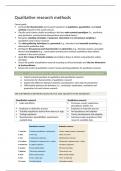Qualitative research methods
Course goals:
Contrast the characteristics and research questions of qualitative, quantitative, and mixed
methods research in the social sciences.
Classify social science studies according to the four main research paradigms (i.e., positivism,
post-positivism, constructivism/interpretivism and critical theory).
Recognize sampling strategies of purposive, theoretical and convenience sampling in
qualitative social science research.
Use data-gathering techniques for generated (e.g., interviews) and naturally occurring (e.g.,
documents) qualitative data.
Distinguish the purposes and characteristics of substantive (e.g., thematic analysis, grounded
theory) and structural (e.g., conversation and discourse analysis) qualitative data-analysis
methods in the social sciences.
Apply the 6 steps of thematic analysis (according to Braun & Clarke) using inductive coding
principles.
Assess the quality of qualitative research according to ethical principles and the four dimensions
of trustworthiness.
Review the results of qualitative research using reporting guidelines for qualitative research
LECTURE 1 – INTRODUCTION TO THE COURSE QUALITATIVE/QUANTITATIVE RESEARCH
o Match research questions to qualitative and quantitative research
o Summarize the characteristics of qualitative research
o Explain the difference between inductive and deductive; emic and etic perspective
o Differentiate between the functions (i.e., contextual, explanatory, evaluative and
generative) of social science research
THE DIFFERENCE BETWEEN QUALITATIVE AND QUANTITATIVE RESEARCH
Quantitative research Qualitative research
Links and effects Processes, events, experience,
perceptions, beliefs, etc.
Emphasis on deductive process Emphasis on inductive process
Testable hypotheses derived from theory or logic No hypotheses and adaption
Testing hypothesis Theory development and adaption
Questionnaires (quantifiable), experiments Interviews (open questions), field
available data research, available data
,The characteristi cs of qualitati ve research (Ritchie e.a., Chapter 1 p4 box 1.1)
Aims and objectives that are directed at providing an in-depth and interpreted understanding of
the social world of research participants by learning about the sense they make of their social
and material circumstances, their experiences, perspectives and histories.
The use of non-standardized, adaptable methods of data generation that are sensitive to the
social context of the study and can be adapted for each participants or case to allow the
exploration of emergent issues.
Data that are detailed, rich and complex (again, the precise depth and complexity of data may
vary between studies).
Analysis that retains complexity and nuance and respects the uniqueness of each participants
or case as well as recurrent, cross-cutting themes.
Openness to emergent categories and theories at the analysis and interpretation stage.
Outputs that include detailed descriptions of the phenomena being researched, grounded in
the perspectives and accounts of participants.
A reflexive approach, where the role and perspective of the researcher in the research process
is acknowledged. For some researchers, reflexivity also means reporting their personal
experiences of ‘the field’.
Deducti ve and Inducti ve
Deductive is top down (Quan) and Inductive (Qual) is bottom up
Eti c versus Emic perspecti ve
Etic perspective = outside perspective
How outsiders of the group interpret behavior
Emic perspective = inside perspective
How members of the group can tell their perspective. As a
researcher asking questions about what happened and you try to
understand their perspective.
Nuances:
Qualitative research can also be deductive(e.g., deductive coding)
Quantitative research can also be inductive (data-driven)
Qualitative research can also depart from an etic perspective (e.g., structured interview;
deductive coding)
Quantitative research can also priorities an emic perspective (e.g. personalized
questionnaire)
2
,Defi ning qualitati ve research
Jerome Bruner: 2 distinct ways of knowing
Different research objectives ask for different methods
Qualitative research as an independent research strategy
The functi on of qualitati ve research in social studies
Functions qualitative versus quantitative
LECTURE 2 – FOUNDATIONS OF QUALITATIVE RESEARCH REFLEXIVITY
- Explain the differences between reflexivity and positionality
- Summarize the characteristics of the four main research paradigms
- Distinguish between representational, inferential and theoretical generalizability
Reflexivity can be described as the process of exploring the ways
in which researchers and their subjectivities affect what is and
can be designed, gathered, interpreted, analyzed, and reported in
an investigation.
o Reflexivity involves examining your own judgments,
practices, and belief systems during the data-collection
process
Systematic assessment of the researcher’s identity, positionality,
and subjectivities as a person and as a researcher. Ongoing
awareness and active address of a researcher’s role and
3
, influence in the development and implementation of research processes and findings. Entails
commitment to intentional self-reflection of biases, theoretical preferences, research settings,
selection of participants, personal experiences, relationships with participants, data generated, and
analytical interpretations (Ravitch & Carl 2021).
Positionality is the researcher’s role and identity in relationship to the context and setting of the
research.
E.g.
o Insider/outsider
o Gender/religion/ethnicity
o Relation research subjects
o Assumptions with paradigm
Reflexivity versus positionality
Reflexivity Positionality
Questioning assumptions Clearly stating assumptions related to the
Finding strategies to address these topic, research design, context and process
It is the full process of the research More statement describing the outcome of
the process
KEY PARADIGMS
Paradigm = Ontology + epistemology Methodology (methodology is the discussion, decisions,
debates and choices you have made to come to you methods).
Ontology – is concerned with the nature of what exists. A key ontological debate concerns whether
there is an external reality and what the nature of this reality is on which there are two positions:
Realism – this position hold that there is an external reality out there which exists
independently
Idealism – this position thinks that reality is mind depended
(Ritchie e.a., Chapter 1 p5 box 1.2)
Epistemology – is concerned with the nature of knowledge and how it can be acquired.
Induction: evidence is used as the genesis of a conclusion - evidence is collected first and
knowledge and theories built from this
Deduction: evidence is used as a support of a conclusion - a hypothesis is first developed
and evidence is then collected to confirm or reject it.
(Ritchie e.a., Chapter 1 p7 box 1.3)
4






